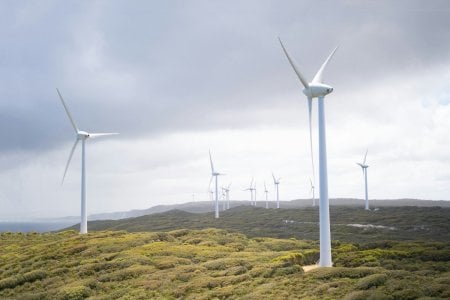Mayor shares plan to slash your energy bills with this strategy
By
Seia Ibanez
- Replies 4
As the cost of living continues to rise, Australians feel the pinch, particularly regarding their energy bills.
But there's a glimmer of hope on the horizon for Melburnians, thanks to a forward-thinking initiative proposed by Melbourne Lord Mayor Nick Reece.
If Reece secures re-election, he has committed to launching Australia’s largest community-led bulk purchasing program for renewable energy across Melbourne, which could significantly reduce power bills for residents and businesses alike.
‘Australians are desperate for power savings at the moment,’ he said.
‘People want relief from the pressure they’re under. I would expect that hundreds of thousands of people and businesses would be signing on to this scheme.’

The initiative, dubbed M-Power, is designed to leverage the collective buying power of households and small businesses to negotiate the lowest possible rates for renewable electricity.
This innovative approach could lead to substantial savings, potentially shaving hundreds of dollars off Melburnians' annual energy costs.
The concept of bulk-buying isn't new, but applying it to the energy market at a community level is a game-changer.
By banding together, consumers can access the purchasing power usually reserved for large corporations.
This not only drives down prices but also promotes the use of clean, renewable energy sources, aligning with the growing demand for sustainable living solutions.
Local business owner Jackie Middleton, who operates six businesses within the City of Melbourne, has already expressed her support for the policy.
‘Since COVID, we’re looking at between 60 per cent and 80 per cent increased business (energy) cost,’ she said.
For Middleton and many others, the M-Power initiative represents a chance to reduce expenses while embracing renewable energy.
But the benefits of this scheme aren't limited to Melbourne's residents and business owners. Other inner-city councils, including Darebin, Hobsons Bay, Maribyrnong, Merri-bek, Moonee Valley, Port Phillip, Stonnington, and Yarra, could also reap the rewards.
Reece envisioned this as a model for local governments nationwide, with the potential to expand beyond Melbourne once the project is up and running.
‘I do hope this is something that other cities around Australia will look at,’ he said.
The cost of implementing the M-Power program, in addition to staffing expenses, is estimated to be up to $2 million.
However, the City of Melbourne plans to reallocate funds from its existing budget to cover these costs.
If Reece's re-election bid is successful, consultations and negotiations for M-Power will commence in 2025, with the first contracts anticipated to be available in 2026.
Melbourne isn't the first to tackle rising energy costs at the local government level.
The Northern Beaches Council in NSW launched an initiative in 2023 to provide small and medium-sized businesses with access to exclusive energy deals.
Similarly, South Australia’s City of Mitcham started a community program in 2021 for bulk-buying solar panels and batteries.
The City of Sydney also made strides in 2020 by signing an agreement for renewable energy to be supplied across the city's facilities.
In a previous story, the federal government announced a range of government rebates and relief packages, with some Aussies eligible to receive anywhere from $300 to $1,672 in support.
Residents are encouraged to check their eligibility for these rebates. You can read more about the story here.
 What are your thoughts on bulk-buying renewable energy? Have you experienced any similar initiatives in your community? Share your stories and opinions in the comments below!
What are your thoughts on bulk-buying renewable energy? Have you experienced any similar initiatives in your community? Share your stories and opinions in the comments below!
But there's a glimmer of hope on the horizon for Melburnians, thanks to a forward-thinking initiative proposed by Melbourne Lord Mayor Nick Reece.
If Reece secures re-election, he has committed to launching Australia’s largest community-led bulk purchasing program for renewable energy across Melbourne, which could significantly reduce power bills for residents and businesses alike.
‘Australians are desperate for power savings at the moment,’ he said.
‘People want relief from the pressure they’re under. I would expect that hundreds of thousands of people and businesses would be signing on to this scheme.’

Melbourne Lord Mayor Reece has pledged to launch Australia’s bulk-purchasing program for renewable energy. Credit: Unsplash
The initiative, dubbed M-Power, is designed to leverage the collective buying power of households and small businesses to negotiate the lowest possible rates for renewable electricity.
This innovative approach could lead to substantial savings, potentially shaving hundreds of dollars off Melburnians' annual energy costs.
The concept of bulk-buying isn't new, but applying it to the energy market at a community level is a game-changer.
By banding together, consumers can access the purchasing power usually reserved for large corporations.
This not only drives down prices but also promotes the use of clean, renewable energy sources, aligning with the growing demand for sustainable living solutions.
Local business owner Jackie Middleton, who operates six businesses within the City of Melbourne, has already expressed her support for the policy.
‘Since COVID, we’re looking at between 60 per cent and 80 per cent increased business (energy) cost,’ she said.
For Middleton and many others, the M-Power initiative represents a chance to reduce expenses while embracing renewable energy.
But the benefits of this scheme aren't limited to Melbourne's residents and business owners. Other inner-city councils, including Darebin, Hobsons Bay, Maribyrnong, Merri-bek, Moonee Valley, Port Phillip, Stonnington, and Yarra, could also reap the rewards.
Reece envisioned this as a model for local governments nationwide, with the potential to expand beyond Melbourne once the project is up and running.
‘I do hope this is something that other cities around Australia will look at,’ he said.
The cost of implementing the M-Power program, in addition to staffing expenses, is estimated to be up to $2 million.
However, the City of Melbourne plans to reallocate funds from its existing budget to cover these costs.
If Reece's re-election bid is successful, consultations and negotiations for M-Power will commence in 2025, with the first contracts anticipated to be available in 2026.
Melbourne isn't the first to tackle rising energy costs at the local government level.
The Northern Beaches Council in NSW launched an initiative in 2023 to provide small and medium-sized businesses with access to exclusive energy deals.
Similarly, South Australia’s City of Mitcham started a community program in 2021 for bulk-buying solar panels and batteries.
The City of Sydney also made strides in 2020 by signing an agreement for renewable energy to be supplied across the city's facilities.
In a previous story, the federal government announced a range of government rebates and relief packages, with some Aussies eligible to receive anywhere from $300 to $1,672 in support.
Residents are encouraged to check their eligibility for these rebates. You can read more about the story here.
Key Takeaways
- Melbourne Lord Mayor Nick Reece has proposed Australia’s largest community-led bulk purchasing program for renewable energy to help reduce power bills.
- The M-Power initiative would use collective buying power to secure lower rates for renewable electricity for households and small businesses.
- The scheme could potentially save Melbourne residents hundreds of dollars annually and is supported by local business owners.
- The program is slated to cost the City of Melbourne up to $2 million and is planned to begin consultations and negotiations in 2025 if Reece is re-elected.







